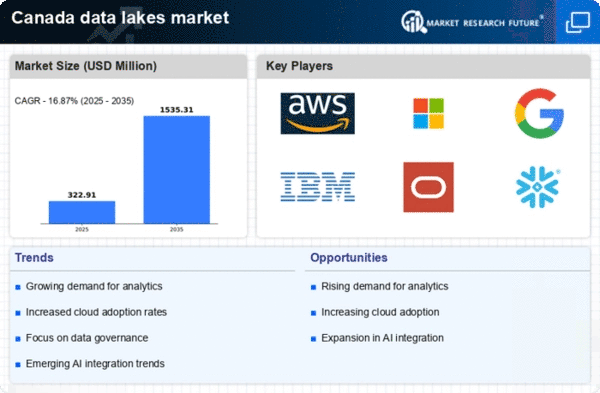Emergence of Hybrid Cloud Solutions
The emergence of hybrid cloud solutions is reshaping the data lakes market in Canada. Organizations are increasingly adopting hybrid models that combine on-premises infrastructure with cloud services, allowing for greater flexibility and scalability. This trend is particularly relevant for industries that handle sensitive data, as it enables businesses to maintain control over critical information while leveraging the cloud for storage and analytics. The data lakes market is benefiting from this shift, as hybrid cloud solutions facilitate the integration of diverse data sources into a unified platform. As companies seek to optimize their data management strategies, the demand for hybrid cloud-compatible data lakes is expected to rise. This could lead to a more dynamic and responsive data lakes market, where organizations can adapt to changing business needs and regulatory requirements.
Focus on Enhanced Data Security Measures
Enhanced data security measures are becoming increasingly vital for the data lakes market in Canada. As organizations accumulate vast amounts of sensitive information, the need to protect this data from breaches and unauthorized access is paramount. The data lakes market is responding to this challenge by implementing advanced security protocols, including encryption, access controls, and continuous monitoring. According to industry reports, approximately 60% of Canadian businesses are prioritizing data security in their IT budgets, reflecting a growing awareness of the risks associated with data management. This focus on security not only safeguards organizational data but also builds trust with customers and stakeholders. Consequently, the data lakes market is likely to evolve, with security features becoming a key differentiator for data lake solutions.
Rising Need for Data Integration Solutions
The rising need for data integration solutions is a significant driver for the data lakes market in Canada. As organizations grapple with disparate data sources, the demand for seamless integration capabilities is intensifying. Businesses are increasingly recognizing that effective data integration is essential for deriving actionable insights from their data lakes. This trend is underscored by the fact that nearly 70% of Canadian enterprises report challenges in integrating data from various platforms. The data lakes market is responding by offering solutions that facilitate the consolidation of structured and unstructured data into a single repository. This integration not only enhances data accessibility but also improves analytical capabilities, enabling organizations to make data-driven decisions more effectively. As the need for cohesive data strategies grows, the data lakes market is expected to expand in response to these integration demands.
Growing Demand for Real-Time Data Processing
The data lakes market in Canada is experiencing a notable surge in demand for real-time data processing capabilities. Organizations are increasingly recognizing the value of timely insights derived from vast datasets. This trend is driven by the need for businesses to make informed decisions quickly, particularly in sectors such as finance and retail. According to recent estimates, the market for real-time analytics solutions is projected to grow at a CAGR of approximately 25% over the next five years. This growth is likely to propel the data lakes market, as companies seek to integrate real-time data processing into their existing infrastructures, thereby enhancing operational efficiency and customer satisfaction. As a result, the data lakes market is poised to expand significantly, driven by the imperative for agility and responsiveness in data management.
Increased Investment in Big Data Technologies
Investment in big data technologies is a critical driver for the data lakes market in Canada. Organizations are allocating substantial budgets to harness the power of big data, with expenditures expected to reach $2 billion by 2026. This influx of capital is primarily directed towards developing robust data architectures that support the storage and analysis of large volumes of unstructured data. The data lakes market benefits from this trend, as companies seek to leverage data lakes for their scalability and flexibility. Furthermore, the integration of machine learning and artificial intelligence into data lakes is becoming increasingly prevalent, enabling organizations to extract deeper insights and drive innovation. As businesses continue to prioritize data-driven strategies, the data lakes market is likely to witness sustained growth fueled by these investments.
















